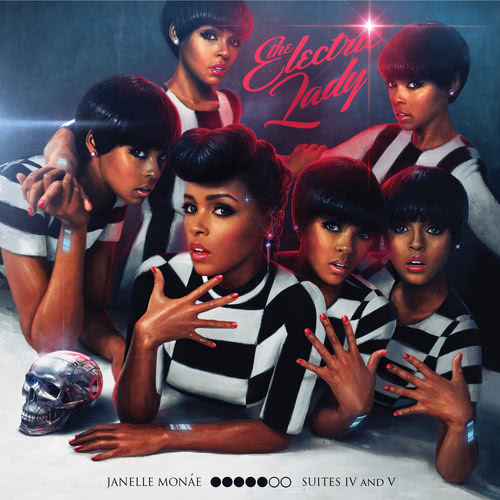It’s hard to describe the work of the masterfully talented woman at the heart of The Electric Lady when she does such a good job of doing it herself.
“Categorize me/I defy every label,” spits the 27-year-old Janelle Monáe in the semi-rap that closes the dirty funk of ‘Q.U.E.E.N.’, upstaging both the track’s guest star – Erykah Badu – and providing a mission statement for Monáe’s own multi-faceted brand of futuristic pop.
On her second full-length, the Atlanta talent once again churns together a post-modernist utopia of funk, soul, rock, RnB, and plenty besides, into an intrepid showcase of cinematic proportions.
The Electric Lady also sounds, shines, and struts just like a modern blockbuster should – complete with front-stacked star cameos from like-minded peers Prince, Solange, and Miguel.
Even more flooring is that like The ArchAndroid – its equally eclectic and fiercely clever forebear – The Electric Lady functions as beautifully as an awing collection of standalone tracks as it does on its merits as a full-blown concept album.
While the continuation of Suites IV and V in the messianic tale of humanoid Cindi Mayweather may result in the slightly hamstrung (but impressively produced) faux radio segments that dot the record, Monáe’s narrative is less important as a story as it is an artistic device to entertain her multiple musical fascinations.
The 19-track epic sashays through sassy pop mania (‘Dance Apocalyptic’), gospel-aided band jams (‘We Were Rock & Roll’), and earnest neo-balladry (‘Primetime’, ‘Can’t Live Without Your Love’) without once sounding stretched.
Love Music?
Get your daily dose of metal, rock, indie, pop, and everything else in between.
All the while, the record has a tightly orchestrated vision and exudes a forceful grace that’s just too damn dynamic to be manufactured.
Monáe’s got the scarily sharp genre-bending smarts (and fabulous musical and production team to execute them) of the great shape-shifters that have gone before her, like Bowie, Stevie Wonder, and Prince.
But what Monáe most powerfully radiates, that those icons obviously lacked, is her strident sense of femininity.
The matriarch oozes with charm and personality as she moves from style to style, song to song, and not once peddling a feminine identity that’s anything less than ferociously independent and intelligent; while celebrating such figures – from ‘Q.U.E.E.N.’ to the title track and ‘Ghetto Woman’.
That’s The Electric Lady’s real heroism: a musical domain where class and aptitude sells 10 times better than sex and image ever could. In fact, it so audaciously transcends boundaries that you entirely forget the unspoken bonds of gender and race that could have conceptually shackled Monáe.
Even if that message is made subliminal as Monáe is spun in clubs, on radio, and into user playlists (and she inevitably will be), it doesn’t detract from the widescreen achievements of her latest opus.
The Electric Lady – like its maker – fizzes with verve, potency, and sheer show(wo)manship and if you can’t find something that moves you – whether in the head, heart, or booty – by the time the curtain draws, then you’ve glossed over one of the year’s best listens.

































